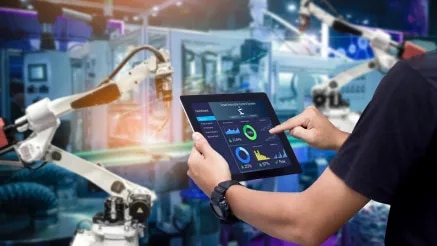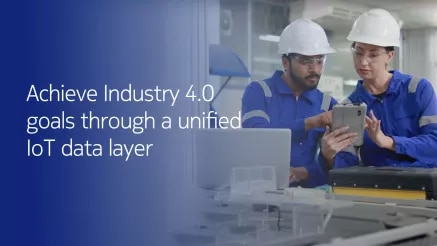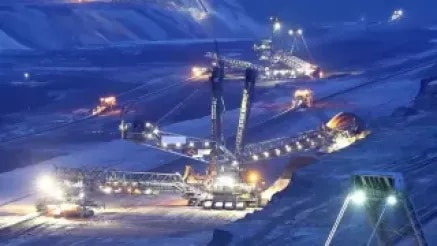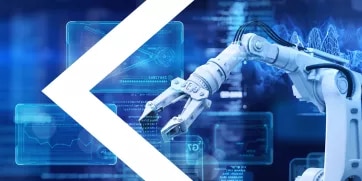- What is the driver behind intelligent industrial shop floor operations?
- How can industries adopt data-driven operational intelligence?
- Data driven operational excellence
- OT Edge DataOps
- Industrial DataOps
- Unified Namespace
- Deep dive to data-driven operational excellence
- Nokia solution for Edge DataOps
- Resources
OT Edge DataOps
Data-driven, intelligent industrial shop floor operations
Achieve Industry 4.0 goals through a unified IoT data layer: Learn how the Nokia MX Industrial Edge can help you achieve your Industry 4.0 objectives through a unified IoT data layer.
What is the driver behind intelligent industrial shop floor operations?
Beyond traditional objectives around efficiency, productivity, resilience, and worker safety, enterprises also want to leverage Industry 4.0 and accelerate their digital transformation to initiate their transition to a circular economy. This will allow them to monitor emissions and material flows, identify ways to reduce carbon emissions and demonstrate how they are tackling the global climate and biodiversity crises.
How can industries adopt data-driven operational intelligence?
Industrial digitalization embraces the entire industrial process across the business, from resource extraction, through supply chain management, production and delivery of goods to the end customer.
At the enterprise level, this requires IT/OT convergence: effectively utilizing OT data with IT tools to measure KPIs and compliance targets, while also promoting automation throughout the data lifecycle.
One of the most exciting trends in industrial digitalization today is sensor fusion, driven by intelligent decision-making close to the controlled asset. By integrating data from multiple sensors in real time, this approach provides a far more accurate, reliable and comprehensive contextual awareness than is possible by accessing data from each sensor independently.
To make this a reality, you need data-driven operational excellence solutions that connect the dots across your entire business. With low-code/no-code applications of a unified data layer, you can seamlessly link all your industrial sensors, controls, automation assets and systems used by various stakeholders across the organization. This is how you future-proof your operations and unlock new levels of efficiency, performance, and collaboration. Ready to make data your competitive edge?
Data-driven operational excellence
Data-driven operational excellence, an augmented and automated decision-making approach is key to achieving business goals using Industry 4.0.
Key technology concept enabling this is DataOps. It's about how data is harnessed and in particular, how it’s leveraged to support daily decision-making at every level of the business – ensuring the right people and machines have access to the right information at any given moment. It involves comprehensive data collection, aggregation and harmonization close the data source, from various sources to gain a holistic understanding of operations.
In certain cases, this can augment human decision-making, for example, using an AI assistant, however in safety critical environments enterprises always require humans to be the final and ultimate decision makers.
Data-driven operations require modern data-architectures that include Edge DataOps and Industrial DataOps/Data Lakehouse with IT/OT convergence.

OT Edge DataOps
As edge computing becomes more prevalent, DataOps practices will extend to the edge, enabling real-time data processing and analysis closer to data sources. Edge DataOps will address the challenges of data locality, bandwidth limitations, and latency, enabling faster and more efficient processing at the edge. This makes OT data generated at the shop floor readily available for multiple use cases, including reporting, analytics, sharing, and decision-making (OT/IT machine learning/AI), for shop floor apps (at the edge) and in the cloud. Edge DataOps is a crucial part of successful IT/OT convergence

Industrial DataOps
Unified Namespace
As edge computing becomes more prevalent, DataOps practices will extend to the edge, enabling real-time data processing and analysis closer to data sources. Edge DataOps will address the challenges of data locality, bandwidth limitations, and latency, enabling faster and more efficient processing at the edge. This makes OT data generated at the shop floor readily available for multiple use cases, including reporting, analytics, sharing, and decision-making (OT/IT machine learning/AI), for shop floor apps (at the edge) and in the cloud. Edge DataOps is a crucial part of successful IT/OT convergence

Industrial DataOps is about making data available to multiple use cases including reporting, analytics, sharing and decision making (OT/IT machine learning/AI), at shop floor level (on the edge) and in the cloud. Key activities are data collection and aggregation, normalization/harmonization, and contextualization.
Industrial DataOps typically uses Data Lakehouse capabilities – these are modern data architectures that create a single platform by combining the key benefits of data lakes (large repositories of raw data in its original form) and data warehouses (organized sets of structured data).

Unified Namespace (UNS) simplifies the challenges of data management and system integration by eliminating the complexities and silos often found in older systems and architectures. Rather than being a software or a physical entity, it serves as a conceptual framework for structuring and accessing data throughout an entire organization. Think of it as common language, enabling seamless communication and data sharing among all machines and software within an enterprise.

Deep dive to data-driven operational excellence
Get an in-depth look at data-driven operational excellence from our White Paper: Rethinking IT/OT convergence: the future of data-driven, intelligent industrial shopfloor operations
Nokia solution for Edge DataOps
Resources
Get in touch with a Nokia expert
Please complete the form below.
The form is loading, please wait...





